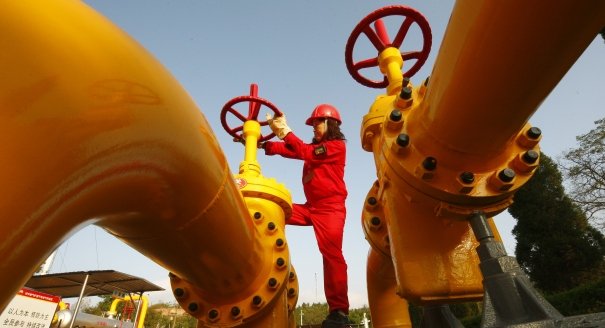Russian and Chinese bilateral energy relations have grown significantly in the last decade, especially in the form of Chinese investment in Russian Upstream and Midstream activities in return for resource access. Through its energy cooperation with Russia, China aims to satisfy its ever growing domestic demand for petroleum products and in particular its natural gas demand which is estimated to more than double by 2015, from 100 Bm3 to 250 Bm3.
At the March 2013 bilateral Chinese-Russian presidential summit, a joint Gazprom-CNPC framework was created for natural gas supply, stipulating the construction of a new pipeline from Siberia to increasingly supply China with gas for 30 years. On September 5, Gazprom and the Chinese National Petroleum Corporation (CNPC) finalized a supply arrangement to send natural gas via pipeline along the “eastern route” that runs right between Kazakhstan and Mongolia through Russia’s Altai mountain range; likely seeking to link into the Central Asian Natural Gas Pipeline. The agreement also eased pricing tensions by explicitly stating that they will not be linked to the Henry Hub, largely because of the competitive environment with Central Asian players now entering the market. Along these lines, CNPC has bought a 20 percent stake in a Novatek LNG project that includes Arctic-capable seaports and airports, possibly in a trade-off due to the delayed opening of the Altai pipeline.
Russia’s petroleum fields are aging, especially the oil fields. More than 80 percent of its total production comes from fields over 60 years old that are well past their half-life if they continue to operate without significant added capital and technological investment. Along these lines, Rosneft and CNPC have recently reached another agreement to jointly develop unspecified fields in Eastern Siberia in order to improve Russia’s oil factor recovery (ORF). CNPC already has a presence in Russia via its joint venture with Rosneft (Vostok Energy) that has already made discoveries in the Irkutsk Oblast and in March of this year received authorization to develop 12 blocs in the Barents Sea region. The oil and gas sites in the Russian Far East are largely unexplored, accounting for a modest 3 percent of the total production as the drilling in Sakhalin was only started in the 1980s; however, nearly 80 percent of these fields are thought to be economically unviable with current Russian capabilities.
Pragmatically speaking it is without a doubt that strong energy relations between Russia and China are complimentary to each other, though they are likely to experience friction as the PRC diversifies imports via Central Asian states. However, until Russia is comfortable with the Chinese presence in the Russian domestic energy market, it is unlikely that favorable ownership potentials will be granted to Chinese companies. The latter need to prove themselves reliable long term partners by attributing something beyond hard currency, for instance technology that improves drilling in the Arctic and other exploitation ventures that can extend the economic viability of the aging Russian energy sector. Geography is the most telling feature of this relationship, as Indonesia becomes unable to further satisfy increasing regional demand. South-East Asia accounted for the bulk of Chinese imports in 2010 at 93.9 Bm3 while the Former Soviet Union contributed only 16 Bm3. Both Russia and Australia will seek to fill this gap and there is clearly a diversification opportunity to increase energy supplies from the Former Soviet Union without disrupting dependency balances. But Russia needs a cheap transit route; something the current Russian LNG technology cannot provide. Thus Russia must seek a pipeline route in the near term, possibly through China, despite Russian reticence towards transit-state relations.
Joe Parson is an analyst of Russian international energy relations.
